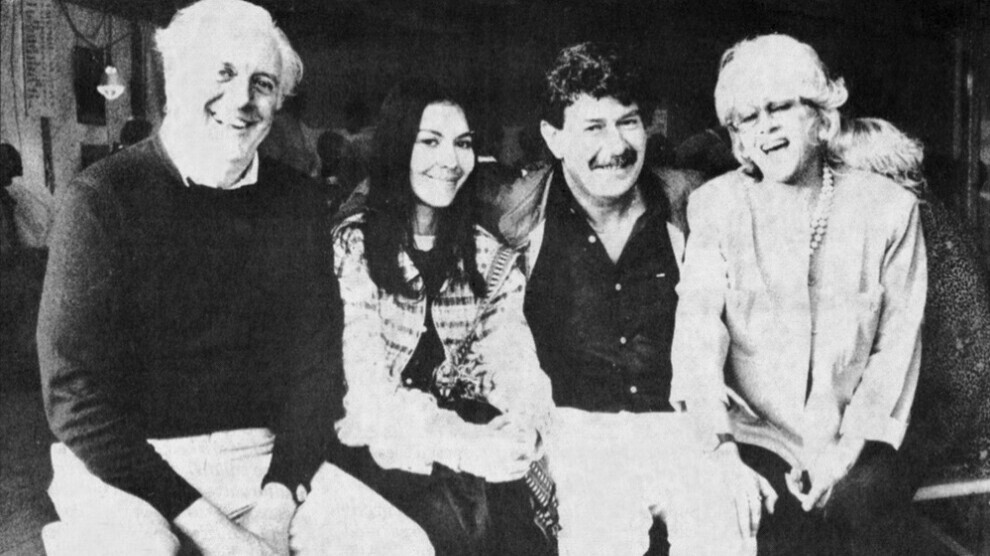Is it a problem for a play being performed in Kurdish?
Theater director Ayşe Emel Mesci questions the ban of a play by Nobel Prize Winner Dario Fo in Kurdish.
Theater director Ayşe Emel Mesci questions the ban of a play by Nobel Prize Winner Dario Fo in Kurdish.

The Kurdish adaptation of the play Trumpets and Raspberries (in Italian Clacson, trombette e pernacchi) by Nobel Prize Winner Dario Fo has been banned in Istanbul, although the Turkish version has been performed for years. Theater director Ayşe Emel Mesci questions the ban.
The performance of the play “Bêrû” (Faceless) by the theater group Jiyana Nû (New Life) has been banned by the Turkish authorities in Istanbul with reference to “public order”.
The comedy, in Kurdish, is based on a work by the Italian Nobel Prize winner Dario Fo. Jiyana Nû is the theater group of the Mesopotamia Cultural Center (Navenda Çanda Mezopotamya) founded in 1992.
Theater director and actress Ayşe Emel Mesci met Dario Fo and his partner Franca Rame, also an actress, playwright and dramaturge, during their time in exile and performed their plays.
She spoke to ANF about the ban of the play in Istanbul and pointed out that the Turkish version of the play has already been shown several times in state and city theaters. “Dairo Fo's pieces have been translated into numerous languages and continue to be shown. Is it a problem if it is performed in Kurdish? It is beyond impossible understanding such a ban.”
The Kurdish play, which had already been performed in urban theaters in Istanbul for three years, was banned during the rehearsal shortly before the performance. "That brings to the question of whether we are to expect a renewed political offensive," said Mesci. The criminalization of a play by Dario Fo, which deals with the connection between politics, economy and terrorism, only contributes to her view that lack of democracy in Turkey is a thought been proved justified. She points out that the ban has been picked up and reported by international media.
Dario Fo received the Nobel Prize for Literature in 1997. In 2013 he wrote a text for World Theater Day that was translated into many languages. “I read the Turkish text out at Dario Fo's request. It was about the relationship between theater and repression,” recalled Ayşe Emel Mesci.
The message from Dario Fo read: “As is well known, the great exodus of the Commedia dell’Arte actors took place in the century of the Counter Reformation. This ordered the closure of all theaters, particularly in Rome, where they were charged with vilifying the Holy City. Under the stubborn pressure of the most reactionary section of the bourgeoisie and the highest representatives of the clergy, Pope Innocent XII. Ordered the closure of the Teatro di Tordinona in 1697, because on its stage, according to the moralists, the highest number of obscene performances had taken place."
Dario Fo quoted a letter written by Cardinal Carlo Borromeo: “While eradicating the evil weed, we had done our utmost to burn texts containing infamous speeches, to eradicate them from human memory, and at the same time prosecute those who spread such texts in print. But even as we sleep, the Devil works with renewed trickery. How far more penetrating to the soul than what the eyes can see! How far more devastating to the minds of boys and young girls is the spoken word, with appropriate voice and gesture, than a dead word in a book. It is therefore as critical for us to rid our cities of performers as we would do with unwanted souls.”
With his own peculiar sense of humour, Dario Fo suggested: “Therefore, the only way out of this crisis is to hope that a great hunt will be organized against us, especially against the young people who want to learn the art of theater: a new Diaspora of comedians, who, from such an imposition, will undoubtedly reap unimaginable benefits from a new kind of performance.”
Ayşe Emel Mesci met Franca Rame and Dario Fo in such a “diaspora”. She had to leave Turkey after the military coup on 12 September 1980 and met Franca Rame in 1981 while on tour in London. She met Dario Fo in Finland in 1984. She tells of that time: “Dario stepped on stage and, before the play began, he signalled the theater people from Turkey who had to flee the country and were in the audience. There was great applause. Later we performed in tents next to each other at the 1986 Theater Biennale. Dario Fo and Franca Rame were people who made us feel at home in exile. Our problems were also their problems."